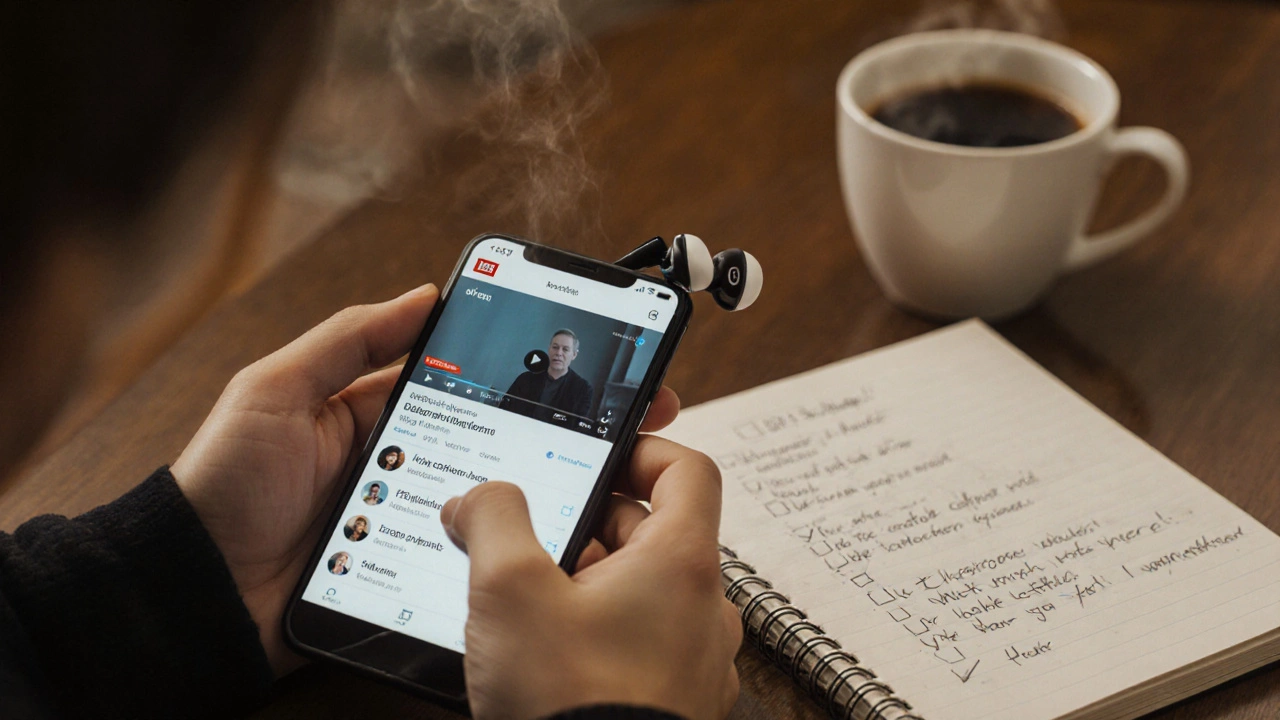Daily Speaking Practice Tracker
Your Fluency Journey
Consistency is the key to fluency. Your daily practice builds muscle memory for speaking.
Log Today's Practice
If you’ve ever frozen mid-sentence when someone asked you a simple question in English, you’re not alone. It’s not about knowing the words-it’s about trusting your voice. Fluency isn’t about perfect grammar. It’s about being understood, feeling comfortable, and speaking without constantly second-guessing yourself. And yes, you can get there-even if you’ve been stuck at the same level for years.
Stop memorizing, start using
Most English learners spend hours memorizing vocabulary lists and grammar rules. But fluency doesn’t come from studying words on paper. It comes from using them in real time. Think of it like learning to ride a bike. No amount of reading about balance will help if you never get on the saddle.Start small. Say three things out loud every morning before you check your phone. It could be: "I’m going to walk the dog," "I need coffee," or "The weather’s better today." Say them slowly. Feel your tongue move. Don’t worry if it sounds odd. Your mouth is learning new muscle patterns. After a week, you’ll notice you don’t have to think as hard to say basic sentences.
Shadowing: the silent hack most people ignore
Shadowing is a technique used by professional interpreters and actors. You listen to a short audio clip-like a podcast or YouTube video-and repeat what you hear, right as they say it. Not after. Not in your head. Out loud, in sync.Start with 15-second clips. Use slow, clear speakers. BBC Learning English or TED-Ed are great. Play one sentence. Pause. Say it out loud. Match the rhythm. The pitch. The pauses. Don’t translate. Just copy. Do this for 10 minutes a day. In two weeks, your brain starts predicting the next word before it’s spoken. That’s when your speaking starts to feel automatic.
Speak to yourself like you’re talking to a friend
You don’t need a conversation partner to build confidence. You need to get used to hearing your own voice in English. Talk to yourself while you cook, shower, or commute. Describe what you’re doing: "I’m chopping the onions," "This bus is late again," "I should call Mom tomorrow."Don’t correct yourself as you go. Let the mistakes happen. The goal isn’t perfection-it’s momentum. After a few days, you’ll catch yourself thinking in English instead of translating from your native language. That’s the real breakthrough.
Record yourself. Then listen. Then try again.
It’s uncomfortable at first. Hearing your own voice in a foreign language can feel cringey. But it’s the fastest way to spot your weak spots. Record yourself answering one question: "What did you do this weekend?" Play it back. Do you mumble? Do you pause too much? Do you say "uh" every three seconds?Write down three things to fix. Maybe it’s your pronunciation of "th" sounds. Maybe it’s rushing through endings like "-ed" or "-s." Next time, focus on just one. Do five recordings in a row, each time improving just that one thing. After ten tries, you’ll sound noticeably clearer.

Find your tribe-not just any native speaker
Not all conversation partners are equal. A native speaker who talks too fast or corrects you constantly won’t help you gain confidence. Look for people who:- Speak clearly, not quickly
- Don’t interrupt you
- Ask follow-up questions instead of fixing your grammar
Try language exchange apps like Tandem or HelloTalk. Filter for people who say "I want to help learners"-not "I need practice." Or join local meetup groups. In Auckland, there are weekly English conversation circles at libraries and community centers. No tests. No pressure. Just talking.
Accept that mistakes are part of the process
You will say things that sound wrong. You’ll mix up tenses. You’ll forget words. That’s not failure-it’s data. Every mistake tells you what to practice next.Instead of thinking, "I messed up," try: "I just learned something." When you say "I go to the store yesterday," and someone gently says, "You mean you went?"-that’s progress. You’re learning. You’re not broken.
One student I know kept saying "I am agree" instead of "I agree." Every time, someone corrected her. She didn’t get upset. She wrote it down. Three days later, she said it right. That’s how fluency builds: one small correction at a time.
Watch how native speakers really talk
Textbooks teach formal English. Real life doesn’t work that way. People say "gonna," "wanna," "kinda." They drop words. They use contractions. They pause with "um" and "like."Watch sitcoms like Friends or The Office. Listen to how they talk between lines. Notice how they start sentences with "So..." or "Anyway..." Don’t copy them exactly-but start using those natural openings in your own speech. It makes you sound less like a learner and more like someone who belongs.

Build a habit, not a goal
Fluency doesn’t come from a 30-day challenge. It comes from showing up, even for five minutes, every single day. Put your phone on silent. Turn on a podcast. Talk along. Say something out loud. Just do it.Set a tiny rule: "I will speak English for five minutes before I check social media." That’s it. No pressure. No goals. Just consistency. After 30 days, you’ll look back and realize you haven’t thought about being nervous in weeks.
You don’t need to sound like a native
The goal isn’t to erase your accent. It’s to be understood. And most people don’t care if you say "tomato" with a different sound. They care if you make sense.Confidence comes from knowing your message gets across. That’s it. You don’t need to sound like an actor. You need to sound like yourself-just in English.
What’s holding you back?
Ask yourself: Is it fear of judgment? Lack of practice? Not knowing what to say?Most of the time, it’s fear. But fear shrinks when you take action. The more you speak, the less scary it becomes. Start today. Say one sentence out loud. Then another. Then another. You’ve already got the words. Now it’s time to let your voice carry them.
How long does it take to speak English fluently?
There’s no fixed timeline. People who practice daily-15 to 30 minutes-usually notice a big difference in 3 to 6 months. Fluency isn’t about knowing every word. It’s about speaking without stopping to think. If you’re consistent, you’ll get there faster than you think.
Should I take an English course to become fluent?
Courses can help with structure and grammar, but they won’t make you fluent on their own. Real fluency comes from speaking, not listening to lectures. Use courses as a tool, not a crutch. Combine them with daily speaking practice, shadowing, and recording yourself.
I’m shy. How do I start speaking with others?
Start with low-pressure situations. Talk to yourself first. Then record yourself. Then try a language exchange app where you can text before calling. Find groups that say "no corrections" or "no judgment." Many libraries and community centers in Auckland host casual English meetups. Just show up. Say hi. You don’t need to be perfect.
Why do I understand English but can’t speak it?
That’s called receptive competence. You’ve trained your ears, not your mouth. Listening and reading are passive skills. Speaking is active. You need to practice forming sounds, sentences, and responses in real time. Shadowing and self-talk are the fastest ways to bridge that gap.
Is it too late to become fluent if I’m older?
No. Adults learn differently, not worse. Children absorb language through play. Adults learn through logic and repetition. That’s actually an advantage. You can focus on patterns, fix mistakes faster, and stay consistent. Many people over 40 become fluent-because they don’t wait for permission to start.

